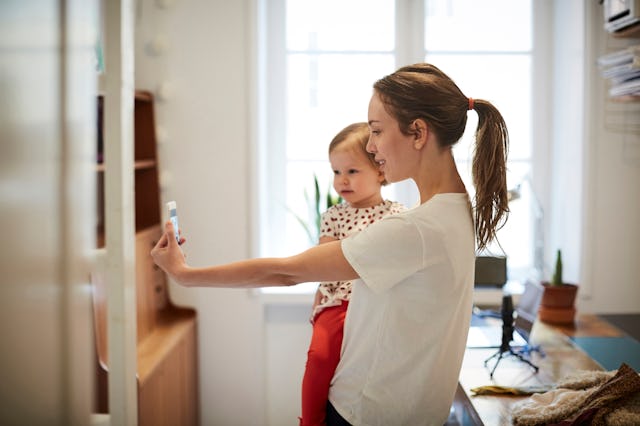Does Using Photo Filters On Pics With My Kids Make Me A Monster? I Asked A Psychotherapist
*Calls Zoë Bisbing from Body-Positive Therapy NYC to discuss ethical aesthetic dilemma*

Ever since Instagram made us all photo editing mavens, I've slapped a filter on, oh, every image I've ever posted. And I don't think much about it — unless my kids are in the picture.
In a recent Snoo work culture expose, we learned that the Snoo founders (allegedly) force their staff to edit smiles onto sleeping babies to help sell their infamously expensive bassinets. There's no question about it: The practice feels... wrong. (Aren't sleeping babies cute enough?!)
But then it got me thinking: If that marketing move is monster status, am I a real piece of sh*t every time I go all Clarendon or Gingham on my own kids? Or is there a difference between improving my lackluster photography skills and giving my infant daughter an Instagram nose job? (Note: I only took one semester of Photoshop in college, so every nose you see in my feed is the real deal ¯\_(ツ)_/¯.)
Because I'm not ready to give up on Instagram editing — even though it admittedly feels icky — I reached out to Zoë Bisbing, the psychotherapist behind Body-Positive Therapy NYC, to help suss out right from really-bad-for-everyone's-mental-health.
"To make a baby smile in their sleep more than a real baby does is sort of weird," she acknowledges. "Marketing images of children figure into parents' expectations, insecurities, and anxieties, especially about developmental milestones."
In other words, Snoo smiles might seem benign until you find yourself comparing your baby to the one you see in their marketing materials and wondering if your child is developing correctly, or even whether they're happy enough. "It can really mess with parents," Bisbing says.
Is it morally different when parents themselves put edited images of their kids into the world? It all comes down to reach, power, and potential for harm, she says. For instance, your little old Instagram account might have a lesser impact than a big-budget brand that circulates thousands of images of babies smiling in their sleep—until your kid sees it and wonders why their life looks so different on your feed.
"It can be pretty harmful to a kid if they ever become aware that their parent changed the shape of their body or face," Bisbing says. "It nonverbally sends the message, 'You are not presentable as you are; I needed to fix you to show you to the world.'" (How. Horrifying.)
She explains that similar risks crop up when you tweak your own appearance: "There's no way to predict whether the moment you edit out your cellulite will be the moment your kid learns to believe that their body isn't right."
All that said, not every photo edit will chip away at your child's self-esteem. "If the lighting is sh*tty and you want to adjust it, I'm not sure anyone will be harmed in the process," says Bisbing.
At the end of the day, you can assess your potential impact by asking yourself who, if anyone, will be harmed by your image edits — no matter the size of your following. And remember: To some extent, selectively posting our best photos counts as editing, too. "I don't want anyone to think they are doing something wrong or bad if they only post the photo where everyone in their family is smiling and looking in the same direction," Bisbing says. "But imagine what it would be like to post the picture that captured the most amazing moment rather than the moment where everyone looked their best," she challenges. (*heart warms*)
The Bottom Line
So, is photo filtering benign or a habit best kicked to the curb? Only your conscience will tell you. Like the rest of parenting, it's up to you to do what feels right. For me, that's a healthy dose of Clarendon (or taking photos in natural light, where my kids really shine.)
Elizabeth is a freelance writer and/or mother of two under 4, depending on when/if her children go the f*ck to sleep. Find her (and her filtered kids) on Instagram.